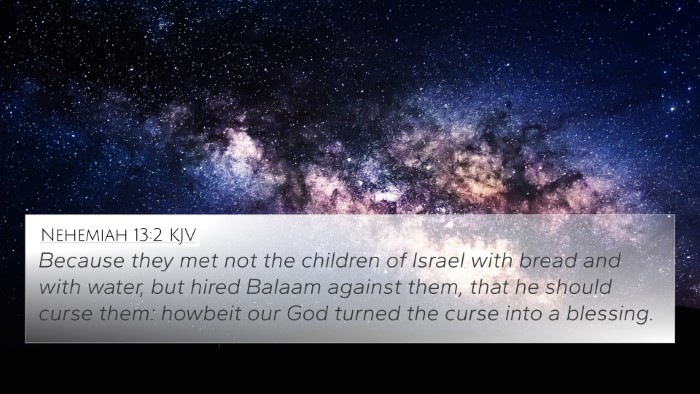Understanding Numbers 23:11
Numbers 23:11 states: "Then Balak said to Balaam, 'What have you done to me? I took you to curse my enemies, and behold, you have done nothing but bless them.'"
In this passage, we encounter Balak, the king of Moab, who had summoned Balaam to place a curse on the Israelites. However, instead of cursing them, Balaam ended up blessing the people of Israel, which emphasizes a significant theme of divine sovereignty and the futility of opposing God's will.
Commentary Insights
-
Matthew Henry's Commentary:
Matthew Henry emphasizes that Balak’s frustration reflects the reality that God’s blessing cannot be undone by human intentions. Henry articulates that despite Balak’s desires and efforts to manipulate Balaam, the prophetic voice speaks only what God ordains. This shows that God's purpose prevails over human plots.
-
Albert Barnes' Notes:
Albert Barnes notes that Balak's complaint reveals his misunderstanding of the nature of prophecy and the power of God. He thought that Balaam was a hired prophet who could be swayed by monetary gain, demonstrating a flawed perception of God's messengers. This highlights the notion that true blessings and curses are rooted in God’s will rather than human transactions.
-
Adam Clarke's Commentary:
Adam Clarke points out that Balaam's failure to curse the Israelites reinforces the covenantal promise and protection that God has over His chosen people. Clarke argues that the narrative serves to remind readers of the supremacy of God’s will and the impotence of opposing it, no matter the worldly power one may possess.
Thematic Connections
This verse serves as a reminder of several key biblical themes:
- The Sovereignty of God: God's plans cannot be thwarted by human attempts at manipulation.
- Divine Blessing: When God blesses, no one can impose a curse; this theme recurs throughout scripture.
- The Role of Prophecy: Prophets speak God’s truth, often in ways that challenge human authority and expectations.
Bible Verse Cross-References
Here are some significant Bible verse cross-references that enrich our understanding of Numbers 23:11:
- Genesis 12:3: "I will bless those who bless you, and him who dishonors you I will curse." - Highlights God’s enduring covenant with Abraham's descendants.
- Psalm 127:1: "Unless the LORD builds the house, those who build it labor in vain." - Establishes the futility of human efforts against God’s designs.
- Romans 8:31: "If God is for us, who can be against us?" - Affirms that God’s favor secures His people against adversaries.
- Proverbs 21:30: "No wisdom, no understanding, no counsel can avail against the LORD." - Underlines the futility of opposing divine will.
- Isaiah 54:17: "No weapon that is fashioned against you shall succeed." - Reiterates God’s protection over His people.
- James 4:7: "Submit yourselves therefore to God. Resist the devil, and he will flee from you." - Shows the contrast of human authority with divine obedience.
- Galatians 6:7: "For whatever one sows, that will he also reap." - A principle underscoring that actions contrary to God lead to adverse outcomes.
Inter-Biblical Dialogue
By studying Numbers 23:11 and its cross-references, we can identify consistent patterns across the Scriptures. These texts testify to God's unwavering support for His people, the integrity of prophetic declaration, and a continuous revelation of God's character through both direct and indirect messaging across the books of the Bible.
Conclusion
In conclusion, Numbers 23:11 reflects profound truths about the nature of God’s blessings and the futility of human endeavors against divine will. The insights provided by public domain commentaries enrich our understanding, elevating our study of Scripture. This verse encourages believers to trust in God’s omnipotent plans, recognizing that true authority comes from the Lord. For those seeking to deepen their understanding of biblical texts, employing tools for Bible cross-referencing can yield invaluable insights, connecting themes and establishing inter-Biblical dialogue that enhances the study of God's word.








